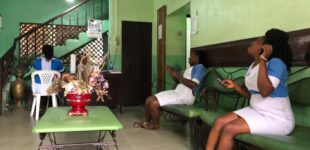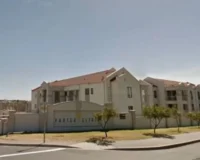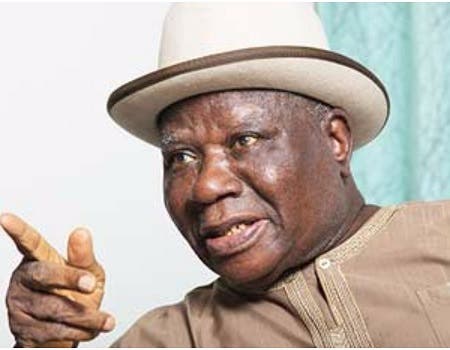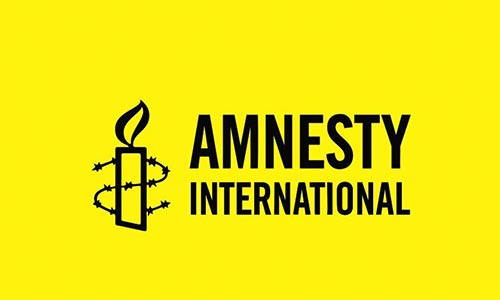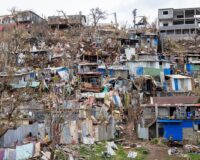Nurses in Akwa Ibom state, disguised as either a secondary school leaver seeking admission or a patient. In this two-part report, he uncovered how the hospitals train and employ unqualified nurses under the guise of auxiliary nursing programme, in the process, endangering patients receiving care at their facilities and extorting the students, some of who are teenagers.
In the dark hours of the morning of October 16, as the sleepy town of Ikot Ekpene in Akwa Ibom state crawled out of bed, a middle-aged pregnant woman was rushed to Demak Clinic and Maternity by her brother. She had developed intense abdominal pain. At the main door of the five-room hospital block, a young girl ushered her into the entrance hall where two boys sat by the corner, chit-chatting.
Although the three of them — all in white uniforms — were “on duty”, they were only nursing trainees currently enrolled in the so-called auxiliary nursing programme being run by the hospital. As they struggled to diagnose her, they asked awkward questions and could not discern the obvious. It did not take long before the woman’s brother noticed their inexperience and immediately, he asked them to stop, demanding to see the doctor or any of their senior colleagues.
In a matter of seconds, a dark-complexioned woman emerged from the corridors and introduced herself as a nurse, before continuing with the diagnosis, instructing the three others who had posed as members of staff to return to their seat.
David Utibe, a nursing trainee at the hospital, would later inform this reporter that as was the case with the nursing students whom the woman had met, students enrolled in the auxiliary nursing programme work on shifts in the hospital and, just like the professional nurses, are often tasked with attending to patients and administering drugs.
He said those three have spent up to one year in the two-year training programme and, as “seniors” now, not only manage patients but also guide other fresh trainees.
“During the first six months (of the nursing programme) when you are doing theory, you will come for lectures like in normal schools. When you start practical, they will show you how to infuse drip, how to set up, how to give medication, how to inject medicine; they will show you medicines and their uses. They will even show you how to stitch up wounds,” Utibe explained.
“When you become a senior after one year, you are the one that will be doing those things. If they bring patients, they will only say, ‘do this or that to that patient. You are the one that will do it. And the people on practical will watch you do it. So that when they become senior, they follow as you and do the same thing.”
This might cause you some migraine: As is being done in the hospital, so it is being done in five others which TheCable investigated in various parts of Akwa Ibom. The health facilities were found to not only breed the so-called auxiliary nurses, but also empower them to carry out the duties of licenced nurses both in the course of the “hands-on” training they organise and by employing them as staff after issuing them a certificate at the end of the programme.
Unlike accredited nursing schools and universities where students are taught strictly based on approved curriculum by regulatory bodies such as the Nursing and Midwifery Council of Nigeria (NMCN), some of the hospitals have no criteria even for admission much less a standard curriculum for the programme; just come as you are and learn as you can.
A good number of tutors are also far from being qualified. In two of the hospitals, TheCable reporter was told the matrons involved in running such programmes are not registered nurses, while in some, the nursing students are left to learn from fellow trainees.
The NMCN told TheCable such practices amount to quackery and, when contacted for their response, none of the hospitals responded except Milestone Specialist Hospital whose founder said contrary to findings, that, “we do six weeks online Strengthening Community Health Workers Programme — a Harvard university Edx programme (and) no auxiliary treats a patient or acts as a nurse here.”
AT DEMAK, NURSING STUDENTS START MANAGING PATIENTS BEFORE COMPLETING THEIR TRAINING
At Demak Clinic and Maternity, close to 100 students are enrolled in the two-year auxiliary nursing programme, with one year for theory and another for practical. But as a nursing student, you do not have to wait for the completion of your programme before you start practising.
Three persons at the hospital including the manager, the matron and Utibe who is nearing the first half of the training, said students are handed the responsibility of managing patients and administering drugs one year into the programme, which is when you are considered a “senior”, although sometimes under supervision.
Anie Utu, the facility’s manager, said repeatedly that the students at the hospital get enough practical experience, prompting this reporter to ask what such entails. “You know we do operation, midwifery and all medical treatment. You will not be watching. You will give injections, do everything,” he said in response, gesticulating with his hands. “We have labs, even people from polytechnics come for their IT (internship).”
On the other hand, Utibe said he can’t wait to write his examination in December to be promoted as a “senior” trainee, so that he can be more involved in managing patients because “I have become perfect.”
“As a beginner, during the first six months when you are doing theory. You will come for lectures from Monday to Friday and you will be writing exams. When you pass, they will post you to this side (the hospital) to stay here. Here in the hospital, you will be working full time,” he added.
He has always dreamt of becoming a nurse but the tuition in accredited schools is very high compared to the N90,000 he paid for the training programme at Demak.
“Here, they will teach you everything (such) that if an opportunity comes, it will not be a strange thing to you,” he said, convinced he had made a good decision after all. “Even if you don’t further, you will still use it and do what you are supposed to do as a nurse.”
TheCable observed that the said school — where close to 100 nursing trainees from four sets are being trained — is nothing more than a shanty structure partitioned into two “classrooms” and tucked behind the hospital where it is gradually being overtaken by grasses.
The facility’s matron and one of the tutors identified as Nurse Susan would later admit that she only have a certificate that only helped her open a medicine store.
“The programme is standard,” she said. When asked if one can practise as a nurse with the certificate given to graduates, she said it “will permit you only for the private sector”.
She added: “Unlike my own, I did the arrangement with somebody who gave me (a) certificate for a chemist. If you want to open a chemist, you can open it but you cannot place this our (certificate) in your shop. This one will give you the knowledge to treat somebody; any type of problem that you see, you will not be afraid. You can do anything.”
OUR LADY HOSPITAL WILL WELCOME YOU ‘EVEN IF YOU FAILED ALL SUBJECTS IN SSCE’
What does it take to study nursing and midwifery either in accredited schools of nursing or universities? The minimum entry requirements are mostly the same: five credits in O’level result in English, mathematics and at least one of biology, chemistry or physics.
But at Our Lady of Lourdes’ Infirmary in Uyo, it is a different ball game. A prospective student does not have to be a science student, neither do they need to pass the aforementioned subjects in their senior secondary certificate examination (SSCE).
When TheCable visited the hospital to seek admission into its auxiliary nursing programme, he was told it is an express entry for him provided he has the N80,000 fee and has “attempted” SSCE.
“Whether the result was good or not, whether arts or science, (just) SSCE attempted, NECO or any one. Whether you have F9 in all subjects, no problem, we want to see it,” Daniel Ngang, the hospital manager, said.
“There are other administrative aspects. There are things that you will be learning as you are going. Even me, I also learn in the process of administrative work. Even the director is also learning; everybody.”
As Ngang discussed with the reporter, auxiliary nursing students were chatting loudly as they wandered in the hall, giving zero impression that the facility is indeed a hospital. However, Ngang looked unbothered as if he barely noticed the noise, and even boasted that the hospital has trained “more than 1,000” auxiliary nurses since it was set up “in 1994”.
After here, you go and practise; the certificate is given. Before any person takes you, you will be interviewed. And if you are able to pass, what again? That is what we do here. Some of the nurses here went through auxiliary,” he said, before adding that it is “the shortest way” of acquiring knowledge in the nursing profession.
As the reporter peeped into his office upstairs, files were stacked from wall to wall, mostly belonging to auxiliary nurses who have passed through the school and a hundred other applicants. He brought out one of the files filled with certificates normally issued to auxiliary nurses during their graduation from the programme, explaining that the qualification can be used “anywhere”.
“Some of those working with us here did their training somewhere, came here when there were vacancies and we employed them. Some of our nurses (also) went through this programme. Some of them didn’t go through formal nursing school,” he said.
When asked of the possibility of the reporter being told he cannot practise as a nurse because he did not go through an accredited nursing school, he wondered, “why won’t you practise?” and then continued, saying: “It is government-approved; the facility is registered. It is just like a private school. Go to all these clinics, there are people working there. They employ them.”
HEALTHCARE BY PHONE
During several visits to the hospital, TheCable spoke to two trainee nurses who confirmed they work in shifts alongside some staff nurses, some of who are not licensed to practise and have only the certificate obtained from the training programme.
One of such nurses who declined to give her name for fear of retribution, confirmed she was employed as a nurse after she graduated from the auxiliary nursing programme and has been working in the hospital for about a year. The trainee nurses interviewed also confirmed they carried out some responsibilities similar to that of registered nurses during the two-year training programme.
“So, what if there is a patient in need of urgent care and the doctor is not around to guide you in cases you are not well knowledgeable about?” the reporter asked
“You can call (the doctor) on the phone,” Ngang said of how to manage such situations as two nursing students watched with keen interest as if he was delivering a lecture. “‘Have you done this?’ You will say ‘yes’. ‘What is it?’ You will talk,” he added, gesturing like he was making a phone call.
“He (the doctor) will now say, ‘okay, since I am far away, give him this’. As you are doing it, they say practice makes perfect. As you are doing it, you will know it.”
Two trainees — Edikan Olof and Aniebet Anita — told TheCable of how their work routine gets stressful sometimes, but added that the much they learn from the hospital is dependent on how committed a person is, as there are no lectures.
“Attending to patients can be guaranteed only when they trust you to take good care of the patient,” Olof, the longest-serving trainee at the hospital, said.
AT SCHOOL OF MILESTONE, ‘LECTURE IS BETWEEN YOU AND PATIENTS’
If you are a patient coming to Milestone Specialist Hospital for treatment, there is a high probability you would think you are at the wrong place when you arrive at the facility which looks like anything but a hospital. At the front of the building is a laundry/provision store, with the entrance to the hospital at a narrow pathway.
Amid the rowdy, overcrowded, unkept and noisy scenes inside the hospital, Aniekan Ukpai, the hospital matron, confirmed that the facility runs an auxiliary nursing programme for a duration of two years and at the cost of N200,000, but added a caveat.
“What you are coming for is admission for (an) auxiliary nurse, it is not a community health worker, not a nursing profession. You are coming as somebody going to learn how to take care of a sick patient. This is a private hospital. You are coming to learn handiwork,” she said.
“We don’t know whether you have A4, A9 or A20. If you are coming to the school of Milestone, nothing like 10 credits, 20 credits,” she added while explaining that the hospital does not require any minimum academic qualification from prospective students.
The matron added that the hospital does not organise lectures for those undergoing the auxiliary nursing programme because “what we are doing, you are seeing it.”
“I am not sure there will be a time when there will be a class. Your lecture is between patients and you. You did not come to see a paper, you came to see a patient,” she said.
Although Ukpai claimed the hospital does not train students to become nurses, three persons interviewed there including Solomon Udo, the owner of the facility who TheCable found out practises as a medical doctor at the University Of Uyo Teaching Hospital (UUTH), admitted that some of the nurses working at the facility were products of the auxiliary training programme.
According to Udo, “everybody we train, they work here. Except you don’t want to work here. You will collect the certificate and go. Definitely, you can work here. Everybody we train, we absorb.”
Asked if nursing students are allowed to work in the hospital in the course of the training programme, he answered in the affirmative, saying: “How will you learn when you are not working?” Does it include administering drugs and so on, the reporter asked, to which he responded, “Yes. That is what I said, hands-on… you learn.”
Sunday Elizabeth, a student who is eight months into the trainee programme, told TheCable she does “everything” including giving injections to patients. But that is not the real gist: The hospital, according to her, allows one to be involved in the healthcare services after just two months of getting admitted if you show commitment and passion to learn.
“For me, when I started, I used to ask questions. But now, I have known all those things. You give patients injections and drugs. Maybe when you are up to two months before they will allow you to do those things… They will ask you to do it, but there will be a staff there who will show you how to do it,” she said.
As the reporter chatted with Elizabeth, a session was ongoing at the theatre where a medical doctor identified as Udo-Ette — was assisted by two trainees and other members of staff. It was during an afternoon shift and, like in other hospitals visited, there were three staff nurses on ground one of whom it was gathered passed through the auxiliary nursing programme.
AT LIFECARE HOSPITAL, ‘NO NURSE IS EMPLOYED FROM OUTSIDE’
At another end of Uyo, a 15 minutes drive from the ever-busy Plaza arena leads you to a two-storeyed building housing Lifecare Clinics/Hospital, another training ground where auxiliary nurses are bred. On the two occasions TheCable visited the facility, trainee nurses were seen in their large numbers, both within the compound and at the second flat housing the hospital’s main block.
Unlike most of the other hospitals where a few of the staff are certified nurses, the hospital has reportedly not employed anyone outside its training programme in recent years, according to one of the students who gave her name as Happiness. Although TheCable could not independently verify the claim, David Umoessien, the medical director and owner of the facility, told the reporter that the hospital sometimes retains graduates of the auxiliary nursing programme to work as staff.
Asked if the hospital can retain the reporter’s cousin to work as a nurse after the programme, Umoessien, who was seated behind the centre-table in his dimly lit office, responded: “It is not always like that; sometimes.”
He also gave the assurance that there will be enough practical during the programme that costs N50,000 for each student, as “we deal with more of practical than theory.”
Speaking to the reporter from the hospital’s security post, Happiness said she has observed the hospital retains students mostly “because of their behaviour”. She also “does everything” while working in shifts alongside some members of staff at the hospital.
THE HOSPITAL WHERE STUDENTS START ‘CLINICAL PRACTICE’ AFTER FIVE MONTHS
If you are looking for the fastest route to starting clinical practice as a nurse, then Unwana Family Hospital and Maternity is a perfect place for you.
As an auxiliary nursing student at the hospital located at the ever-busy road in Nkemba street in Uyo, you have the rare privilege of taking a break from the ‘classroom’ where you are being taught how to attend to patients to start your practice in the wards — just after four months.
The school has a striking criterion though, being that you “must be cool-headed”, according to the head of the facility who introduced himself as Dr. Umana.
“If they ask you to measure some drugs and give to a patient, out of carelessness you (may) either give overdose or underdose and that will be a problem,” he said in explaining why the facility prefers cool-headed students.
When TheCable first visited the hospital, three nursing trainees were on duty with a middle-aged staff nurse who confirmed that although the hospital runs an auxiliary nursing programme at the cost of N120,000, the next batch of students won’t be admitted until January 2021.
While the hospital claims it takes only science students, findings including from two of its current trainees showed that it does not have any standard curriculum for the students, who it claims are being trained in “blocs”.
Speaking from behind his office desk, Umana told TheCable “there are so many things a candidate will learn” within the two years of being trained as an auxiliary nurse.
“This is a programme that has to do with human lives. There is what we call bloc; you will remain in the bloc where you will be taught the theory for five months. After that, we now ask you to run shifts,” he said.
Industry experts told TheCable that the idea of auxiliary nurses which originated from countries like the United States was to provide assistance to licensed nurses without having anything to do with managing patients.
“Initially, auxillary nurses were designed to support scarcity of nurses and should work under supervision of a senior well-trained nurse. But like every good intention, it has been bastardised,” said Agwu Nnanna, a medical doctor based in Kogi state.
TheCable visited three hospitals in Abuja and found out that, in direct contrast with what is obtainable in the hospitals investigated in Akwa Ibom, these facilities employ special assistants to aid the nurses in carrying out their work.
At the National Hospital, Abuja, TheCable gathered that “healthcare assistants” are employed for such roles, while at Garki Hospital which is government-owned but privately run, an official of the human resources department said the hospital makes use of patient care assistants (PCAs) to offer services which nurses often need as a form of support.
While the hospitals had claimed there was nothing wrong with the programme, their argument is premised on the fact that it is not recognised by the act establishing NMCN. But the act, however, prohibits individuals from acting in ways “implying” that they are authorised to practise as registered nurses.
Patricia Akpeh, head of the NMCN south-south zone, told TheCable the council does not recognise anything as “auxiliary nursing”, adding that the body will not hesitate to shut down hospitals training nurses.
This is a special investigative project by Cable Newspaper Journalism Foundation (CNJF) in partnership with TheCable, supported by the MacArthur Foundation. Published materials are not views of the MacArthur Foundation.

